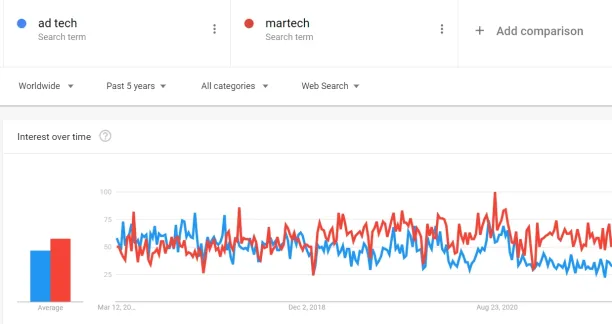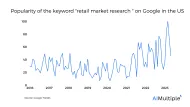Ultimate Ad tech & MarTech Guide in 2024
Ad tech and martech have been inevitably linked but technically two very distinct areas of technology. As seen in Figure 1, the interest in these two words almost always went hand in hand, but seems to change in recent years. As digital marketing grows its share in overall marketing spend around the world, ad tech and mar tech tools get more established applications. In this guide, we will compare how ad tech and martech are different from each other and list the top applications of both technologies.

Ad Tech vs MarTech in a Snapshot
| Ad Tech | MarTech | |
|---|---|---|
| Applications | Ad-level, applied directly on a specific ad | Campaign or brand level |
| Billing | Usually variable based on ad volume | Usually fixed price as SaaS |
| Operation | Usually run by marketing agencies, can be owned by the
advertiser too
| Usually owned and ran by the advertiser |
| Usage Frequency | Continously during an active advertisement campaign | Can be both continously or at specific times e.g. campaign
launch, brand audit...
|
| Top Solutions | DMPs, CDPs, DSPs, ad tracking & verification tools | Web analytics, social media management, SEO, brand protection, CRM |
Top Ad Tech Solutions
Ad tech solutions are tools that help online advertising at “micro level” which impacts a specific ad. These tools are often scalable technologies that are activated per each online ad. Therefore, these tools may be owned by marketing agencies and used for their advertiser clients, which shares the cost of the technology across businesses and reflect them a variable cost based on their advertising volume. However, it is also possible for advertisers to directly work with an ad tech solution on SaaS basis and ask their marketing agencies to operate their own solution.
Below is a list of top ad tech applications. For more details on how each one of them works and which technologies they leverage, read our detailed post in the subject.
1. Data Management Platforms (DMPs) and Customer Data Platforms (CDPs)
DMPs and CDPs are databases tailored for keeping customer data. DMPs keep anonymized customer data at cookie level and operate mostly within programmatic advertising. CDPs on the other hand keep identifiable customer data and operate mostly within one-to-one communication such as email marketing. The difference of these tools with other similar customer data platforms, such as CRM platforms, is that DMPs and CDPs specialize at storing, grouping and filtering customer data based on desired criteria and segments.
2. Demand Side Platforms (DSPs)
DSPs are platforms that does the bidding process of programmatic advertising. Advertisers specify the target audience, their budget and the campaign they want to run on DSPs. The rest is handled by DSPs’ algorithms to find the most optimal platform and budget to run the ad. DSPs maintain relationships with publishers to have access to their ad placements, and also connect with DMPs of advertisers to match advertisers’ cookie data with the targeted audiences to show the ads.
3. Ad Verification and Tracking Tools
Ad tracking tools reports the performance of the ad for the advertiser to know whether the ad served its purpose or not. The reporting includes measurements such as whether the traffic came from a human or clickbots, whether the ad was displayed on the screen sufficiently enough to be viewed or whether the ad was shown on a website that its content is considered safe. These measurements are standardized by Media Rating Council and Interactive Advertising Bureau (IAB) and ad tech solutions that offer tracking and verification can get accredited by these third parties to ensure their technology is in industry standards.
Top MarTech Solutions
Martech solutions are tools that help online advertising at “macro level” which oversees a brand’s performance and presence over time and across all online ads. These tools may be owned by advertisers directly for continous improvement of their online presence and services. Therefore, they often provide SaaS technologies for companies to subscribe in different tiers. Martech solutions can also be offered by media agencies similar to adtech solutions. In such cases, advertisers can also request marketing agencies to deliver the data that martech solutions collect on behalf of the advertiser if they want to run in-house analytics with this data.
Social media is no longer only a marketing platform but also a direct gateway to shop online. In 2021, Facebook reported that more than 1 billion Facebook users visited Facebook marketplace each month. Instagram shop as well reaches 187 million users per month.
Social media management platforms are end-to-end ecosystems in itself. They help you schedule your content, share tips to optimize when and how to share it, and report the performance of your campaign. As a more advanced approach on top of your performance analysis, you can also use natural language processing to conduct social listening and sentiment analysis on data collected from the web.
2. Web Analytics and Website Optimization
Regardless of providing services online or not, websites are where businesses provide information about their products or build a brand image on customers. Once you set up a business website, you need to track how much traffic you receive, which sources bing you the most traffic or how much time your visitors spend on your website. As seen on Figure1, heat maps are also a crisp way to visualize where your visitors hover their mouse the most, as the parts of your website that receives the most attention. There are many martech tools you can leverage for optimizing your website traffic and experience. In order to some of the free website analytics tools or solutions that you can build in house, check out our detailed post about the subject.
3. Search Engine Optimization
More than 50% of internet users click on one of the top 3 results of their web searches. This means that regardless of how good quality your website content or your product is, the competition to rank higher on a search engine is critical to getting noticed by your potential customers. Search engine optimization tools help a website to rank higher on organic search results. The ranking algorithm of search engines, the leading one being Google, depends on multiple factors and get updated year by year. Therefore, SEO becomes a crucial martech expertise that businesses need to stay up to date on.
4. Brand Protection
As brands’ online presence grows, the risk of ad fraud and copyright infringement become more prevalent. Martech solutions in this space provide services like scanning the web to find copycat websites or potentially false claims that may damage your brand protection. Read our detailed posts about brand protection and copyright infringement to learn more about how brand protection works and real life examples.
5. Customer Relationship Management (CRM)
CRM helps brands to build a continous relationship and productive communication with customers. Third party cookies are going to be discontinued by Google, which is a big show-stopper for online targeted advertising. CRM and one to one communication with customers is likely to gain more importance with this change. Martech solutions in this space offer customer databases, automation tools for email marketing and also optimizing which customerts to offer what promotions.
For more on marketing technology
For more on the latest technology trends in marketing, check out our research in:
- Digital Transformation in Marketing: Top Trends & Technologies
- Marketing Automation: Benefits, Trends & Challenges
If you believe that your business may benefit from a web scraping solution, check our list of web crawlers to find the best vendor for you. And check our comprehensive hub of marketing solutions to explore different approaches in your business.
For guidance to choose the right tool, reach out to us:
This article was drafted by former AIMultiple industry analyst Bengüsu Özcan.

Cem has been the principal analyst at AIMultiple since 2017. AIMultiple informs hundreds of thousands of businesses (as per similarWeb) including 60% of Fortune 500 every month.
Cem's work has been cited by leading global publications including Business Insider, Forbes, Washington Post, global firms like Deloitte, HPE, NGOs like World Economic Forum and supranational organizations like European Commission. You can see more reputable companies and media that referenced AIMultiple.
Throughout his career, Cem served as a tech consultant, tech buyer and tech entrepreneur. He advised businesses on their enterprise software, automation, cloud, AI / ML and other technology related decisions at McKinsey & Company and Altman Solon for more than a decade. He also published a McKinsey report on digitalization.
He led technology strategy and procurement of a telco while reporting to the CEO. He has also led commercial growth of deep tech company Hypatos that reached a 7 digit annual recurring revenue and a 9 digit valuation from 0 within 2 years. Cem's work in Hypatos was covered by leading technology publications like TechCrunch and Business Insider.
Cem regularly speaks at international technology conferences. He graduated from Bogazici University as a computer engineer and holds an MBA from Columbia Business School.
To stay up-to-date on B2B tech & accelerate your enterprise:
Follow on

Comments
Your email address will not be published. All fields are required.